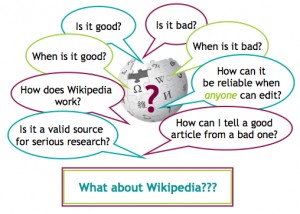
There is some debate about Wikipedia as a research source. People tend to be either radically for Wikipedia, or radically against its use, particularly in academic settings. These people tend to focus on one simple question: Is Wikipedia good or is it bad? Clearly we need to ask better questions and delve into Wikipedia more deeply in order to decide on its best use.
What is Wikipedia?
Wikipedia is an encyclopedia that is collaboratively written by a large group of Internet volunteers. The fact that anyone can contribute to an article in Wikipedia is the most frequent criticism of it as a reliable source. Having volunteer contributors (Wikipedia calls them editors) is both Wikipedia’s strength and its weakness. The best articles in Wikipedia can be richer than most other reference sources. The worst articles would never even make it into encyclopedias provided by reputable publishers.
Are Wikipedia Articles Reliable and Accurate?
With Wikipedia, it’s really up to the reader to make judgements about the reliability of individual Wikipedia articles, and to do that, readers need to be “Wikipedia literate”.
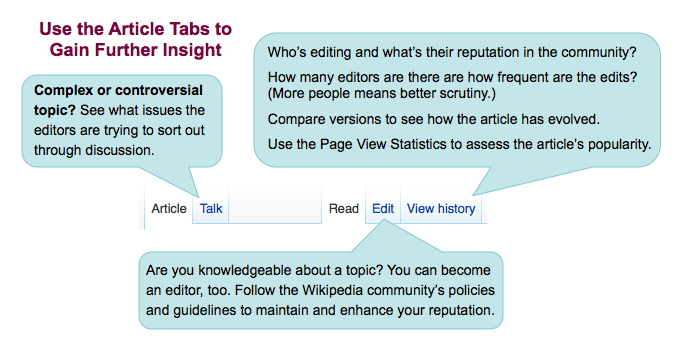
Wikipedia articles are more likely to be reliable and accurate when:
- Many editors are actively contributing. Find this out by clicking on the View history tab at the top of the article. Here you can see who is editing and how frequently the article is being edited. You can even compare different versions to see how the article has evolved. You can click on any individual editor to view his/her profile and reputation in the Wikipedia community of editors.
- It is receiving a lot of scrutiny from Wikipedia users. Go to the View history tab and use the Page View Statistics to see how many people have viewed the article over time.
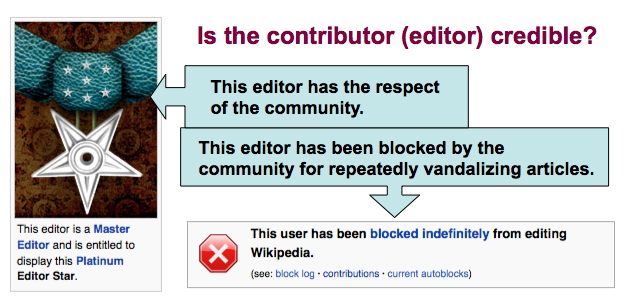
Wikipedia articles are more likely to be unreliable and inaccurate when:
- Only one or a small number of editors are contributing, and the edits are old and infrequent. Check the View history tab to make your assessment.
- It receives very little scrutiny from Wikipedia users. Use the Page View Statistics to make your assessment.
What kind of information can be found in Wikipedia?
Wikipedia is a general encyclopedia, and as such it is a compilation of neutral information from many branches of knowledge and on a wide range of topics.
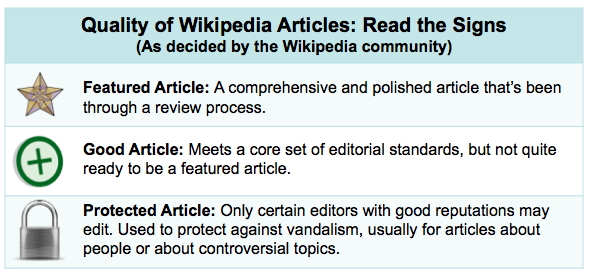
In a good Wikipedia article you are likely to find:
- A general overview of the topic, logically organized into relevant sub-topics
- Facts and figures that support the information in the article
- References to information sources and links for further exploration.
You will NOT find the following kinds of information in a Wikipedia article:
- Contributions from recognized experts. This is the greatest distinction between Wikipedia and other formally published encyclopedias.
- Expert analysis. Wikipedia is an encyclopedia, which by definition contains only neutral, “factual” information.
- Original research. Encyclopedias do not publish original research. An encyclopedia is a secondary source.
What is the best way to use Wikipedia?
Use it like any good reference source, for quick reference or as an entry point into deeper exploration of the topic. An encyclopedia article is a great source for:
- A general overview of the topic and related sub-topics
- Quick information: facts and figures
- References to deeper sources
- Links to related information
Where should I look for deeper information, like expert analysis and original research?
- Books written by recognized experts can be found in your school library collection or the collections of other libraries.
- Current research and expert analysis can be found in the online databases in the WRDSB Virtual Library.
- Original research published in peer-reviewed academic journals can be found in the online databases in the WRDSB Virtual Library.
- Expert, reliable information can also be found in open access journals and other reliable Internet sources.
Wikipedia’s Volunteer Editors Give You Help in Assessing the Quality of Articles
Wikipedia has a sophisticated community structure, with core editorial standards and guidelines for contributors. Dedicated to making the resource as useful as possible, Wikipedia’s most trusted editors help you to assess the quality of an article.
Read the Signs
Many articles have icons with a brief explanation at the top. Here are some examples, and what these warnings by trusted editors mean for your research.
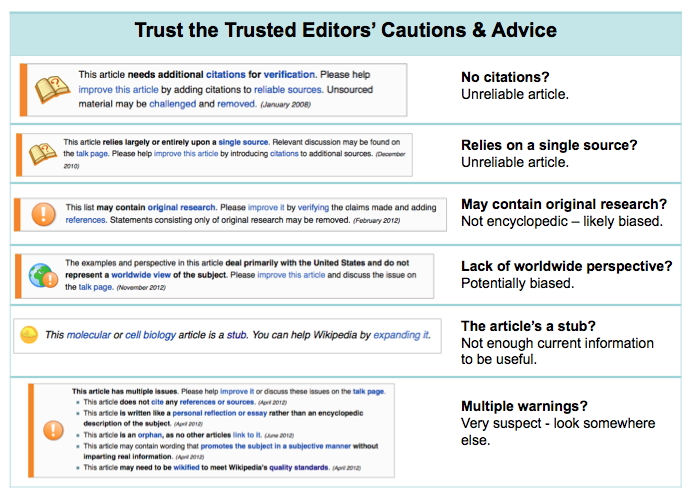
Can I Cite Wikipedia?
Decisions about citing Wikipedia really depend on what you are writing. While a link to a good quality article for quick reference in a piece of informal writing may be very useful, Wikipedia should likely not be cited for more formal writing.
- Informal Writing: A link or reference to a good Wikipedia article is appropriate for quick reference or to link to further information.
- Reports, Procedural Writing, Personal Essays, Persuasive Writing: Citing a good Wikipedia article or any other reference work may be appropriate to corroborate information that is not common knowledge. Check with your teacher for requirements specific to the assignment.
- Formal Academic Writing: Citing any encyclopedia, Wikipedia or otherwise, is not part of formal academic writing. Citations in formal academic writing are for referring to original research and/or expert opinion that backs up the point you are making or strengthens your thesis. Reference or Works Cited lists only include sources you have actually quoted or paraphrased in your paper. While you may have used Wikipedia at the beginning stages of your research to get a general overview or to make connections to deeper sources, Wikipedia or any other general reference source should likely not be cited.
More help from the Library Learning Commons:
- Find the Right Source
- Evaluating Sources
- What Must I Cite?
- Style Guides: MLA, APA, Annotated Bibliographies, Informal Citation
